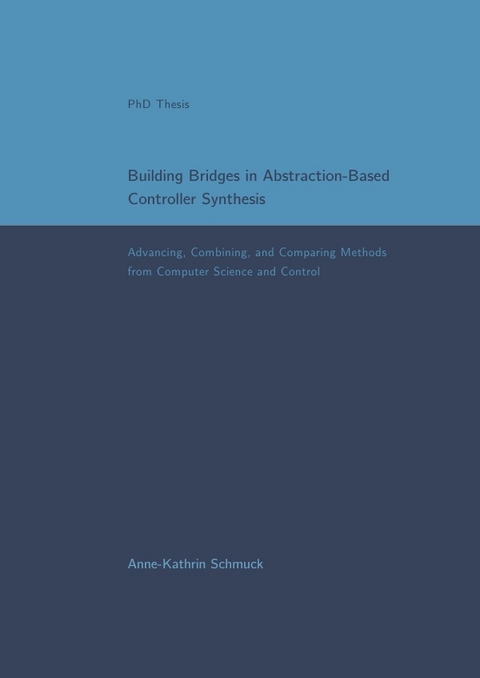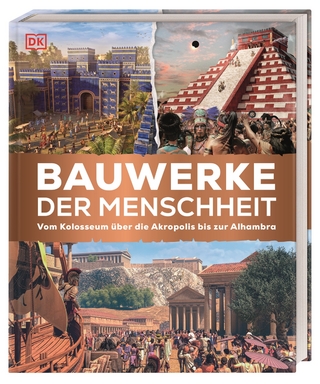
Building Bridges in Abstraction-Based Controller Synthesis
Advancing, Combining, and Comparing Methods from Computer Science and Control
Seiten
2015
|
3. Auflage
epubli (Verlag)
978-3-7375-7174-6 (ISBN)
epubli (Verlag)
978-3-7375-7174-6 (ISBN)
- Titel leider nicht mehr lieferbar
- Artikel merken
This book advances, combines, and compares methods from computer science and control for abstraction-based controller synthesis
Abstraction based controller synthesis is a well established two-step procedure to solve complex control problems involving discrete valued quantities. First, a symbolic abstraction of the system to be controlled is generated providing a discrete time model with a finite, discrete valued signal space and finitely many states. Second, a symbolic controller for a desired symbolic specification is constructed using the previously generated symbolic model. This controller synthesis approach is usually used in two different settings. Either (i) the specification is naturally given by a Linear Temporal Logic (LTL) or a Computation Tree Logic (CTL) formula over a finite set of symbols, which can only be encountered by symbolic controller synthesis techniques. Or (ii) the system to be controlled is naturally equipped with a finite set of external symbols through which it interacts with its environment, e.g., the controller.In Part I we will investigate the abstraction step of two different approaches, namely quotient based abstractions (QBA) and strongest asynchronous l-complete approximations (SAlCA), tailored to setting (i) and (ii), respectively. It will be shown that the resulting abstractions are generally incomparable. We will therefore derive necessary and sufficient conditions on the original system which allow for a detailed comparison. When the second setting is considered, the desired specification might not naturally be symbolic. However, to apply supervisory control theory (SCT), a framework for symbolic controller synthesis commonly used in combination with SAlCA, the specification is required to be modelled by a deterministic finite automaton (DFA). This motivates the investigation of larger specification classes to enrich the applicability of abstraction based controller synthesis in setting (ii). In Part II we show that SCT can be extended to handle specifications realized by deterministic pushdown automata (DPDA).
Abstraction based controller synthesis is a well established two-step procedure to solve complex control problems involving discrete valued quantities. First, a symbolic abstraction of the system to be controlled is generated providing a discrete time model with a finite, discrete valued signal space and finitely many states. Second, a symbolic controller for a desired symbolic specification is constructed using the previously generated symbolic model. This controller synthesis approach is usually used in two different settings. Either (i) the specification is naturally given by a Linear Temporal Logic (LTL) or a Computation Tree Logic (CTL) formula over a finite set of symbols, which can only be encountered by symbolic controller synthesis techniques. Or (ii) the system to be controlled is naturally equipped with a finite set of external symbols through which it interacts with its environment, e.g., the controller.In Part I we will investigate the abstraction step of two different approaches, namely quotient based abstractions (QBA) and strongest asynchronous l-complete approximations (SAlCA), tailored to setting (i) and (ii), respectively. It will be shown that the resulting abstractions are generally incomparable. We will therefore derive necessary and sufficient conditions on the original system which allow for a detailed comparison. When the second setting is considered, the desired specification might not naturally be symbolic. However, to apply supervisory control theory (SCT), a framework for symbolic controller synthesis commonly used in combination with SAlCA, the specification is required to be modelled by a deterministic finite automaton (DFA). This motivates the investigation of larger specification classes to enrich the applicability of abstraction based controller synthesis in setting (ii). In Part II we show that SCT can be extended to handle specifications realized by deterministic pushdown automata (DPDA).
nein
| Erscheinungsdatum | 24.08.2016 |
|---|---|
| Sprache | englisch |
| Maße | 170 x 240 mm |
| Gewicht | 376 g |
| Themenwelt | Sachbuch/Ratgeber ► Natur / Technik ► Technik |
| Technik | |
| Schlagworte | Abstraction Based Controller Synthesis • Behavioral Systems Theory • Supervisory Control Theory |
| ISBN-10 | 3-7375-7174-0 / 3737571740 |
| ISBN-13 | 978-3-7375-7174-6 / 9783737571746 |
| Zustand | Neuware |
| Haben Sie eine Frage zum Produkt? |
Mehr entdecken
aus dem Bereich
aus dem Bereich
die wichtigsten Begriffe, Bautypen und Bauelemente
Buch | Softcover (2024)
Prestel (Verlag)
CHF 44,75
Buch | Hardcover (2021)
C. Bertelsmann (Verlag)
CHF 25,20
vom Kolosseum über die Akropolis bis zur Alhambra
Buch | Hardcover (2023)
DK (Verlag)
CHF 29,90


